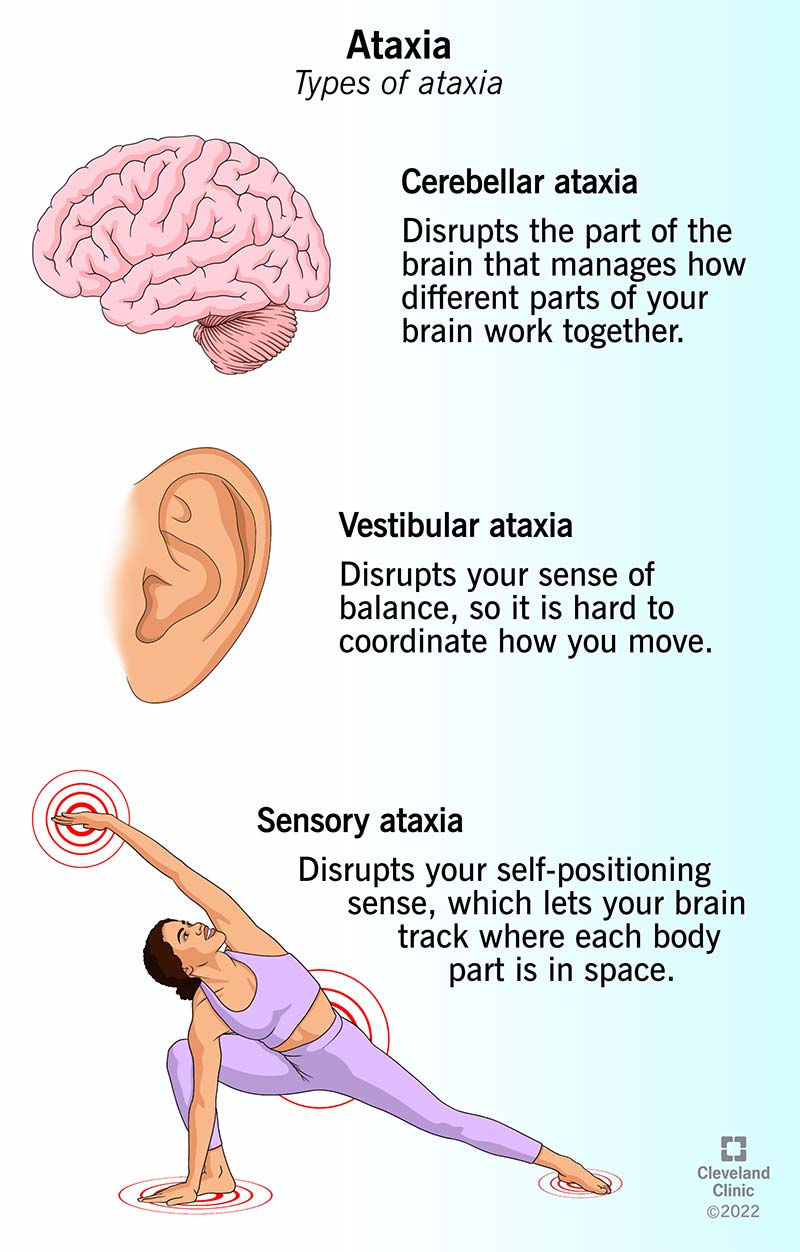Ataxia is when you have problems coordinating how your muscles work, leading to awkward, unwieldy or clumsy movements. It’s a possible symptom with a wide range of conditions or circumstances, or it can happen as a stand-alone condition. Depending on why it happens, it’s sometimes possible to treat or reverse the effects of ataxia.
Advertisement
Cleveland Clinic is a non-profit academic medical center. Advertising on our site helps support our mission. We do not endorse non-Cleveland Clinic products or services. Policy

Image content: This image is available to view online.
View image online (https://my.clevelandclinic.org/-/scassets/images/org/health/articles/17748-ataxia)
Ataxia is when you have a problem with coordination, causing you to move in an uncertain, awkward or even clumsy way. It’s usually a sign of a problem with an area of your brain, ears or other parts of your nervous system.
Advertisement
Cleveland Clinic is a non-profit academic medical center. Advertising on our site helps support our mission. We do not endorse non-Cleveland Clinic products or services. Policy
Ataxia can refer to a group of diseases or a symptom of certain diseases. As a symptom, ataxia is extremely common. Ataxia as a condition is not as common and tends to happen only with certain genetic conditions and diseases.
Ataxia and apraxia sound alike and have many similarities. However, there are also key differences.
There are three main types of ataxia, which happen in different ways.
Advertisement
Because there are different types of ataxia, there are also many different possible causes. Experts group the causes into the following categories:
Some examples of conditions or circumstances that can cause ataxia include:
The treatments for ataxia depend on why it happens in the first place. Some of the causes, especially the temporary ones like alcohol intoxication, may not need any treatment. Others may only need minor treatments, such as vitamin supplements for a vitamin B12 deficiency.
Because there are so many causes and each case is different, your healthcare provider is the best person to tell you what kind of treatments are possible and likely to help you. The information they provide will be the most relevant to your particular situation.
In many cases, people develop ataxia symptoms because they’re tired or stressed. In these cases, rest and downtime are all you need. The same is true for ataxia that comes from drinking alcohol (except when it happens with dangerous amounts).
However, under certain circumstances, ataxia isn’t a symptom you should try to self-diagnose, treat yourself or ignore. More about those circumstances is below under “When should ataxia be treated by a doctor or healthcare provider?”
There are some preventable causes of ataxia. However, many of the causes happen unpredictably, so you can’t avoid or prevent them. It’s also not always possible to reduce the risk of developing this symptom.
Advertisement
The following causes of ataxia are usually — but not always — preventable:
Advertisement
There are certain warning signs that ataxia is happening because of a more severe problem that needs medical attention. You should talk to a healthcare provider if you have ataxia with any of the following circumstances:
Whether or not ataxia will affect your lifespan depends entirely on why it’s happening. Many of the causes of ataxia — especially the curable, reversible or temporary ones — won't affect how long you'll live.
However, some causes of ataxia can have major impacts on your life. Some can shorten how long you can expect to live, keep you from participating in or enjoying certain activities, or can make it difficult for you to live your life without some form of assistance. Your healthcare provider is the best person to tell you what effect — if any — ataxia will have on your lifespan and how you live.
Advertisement
Ataxia is often a symptom of conditions that affect your brain, nervous system or ears. It can also be a condition you have when you're born or develop later in life. This issue can have little or no effect on your life or cause severe disruptions. It can also be a temporary or curable issue, while others will experience it as a long-term or permanent problem. Your healthcare provider is the best person to tell you more about why you have this symptom and your options for treatment. They can also recommend treatments or ways to adapt to this condition to limit or prevent disruptions to your life.
Learn more about the Health Library and our editorial process.
Cleveland Clinic's health articles are based on evidence-backed information and review by medical professionals to ensure accuracy, reliability, and up-to-date clinical standards.
Cleveland Clinic's health articles are based on evidence-backed information and review by medical professionals to ensure accuracy, reliability, and up-to-date clinical standards.
If you have a neurological condition, you want expert advice. At Cleveland Clinic, we’ll work to create a treatment plan that’s right for you.
